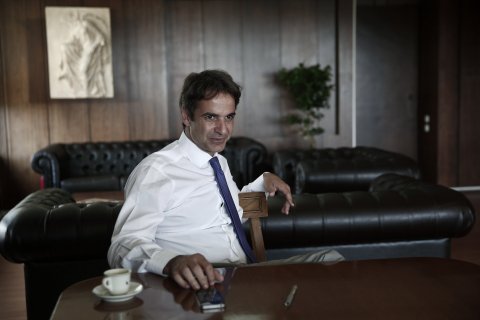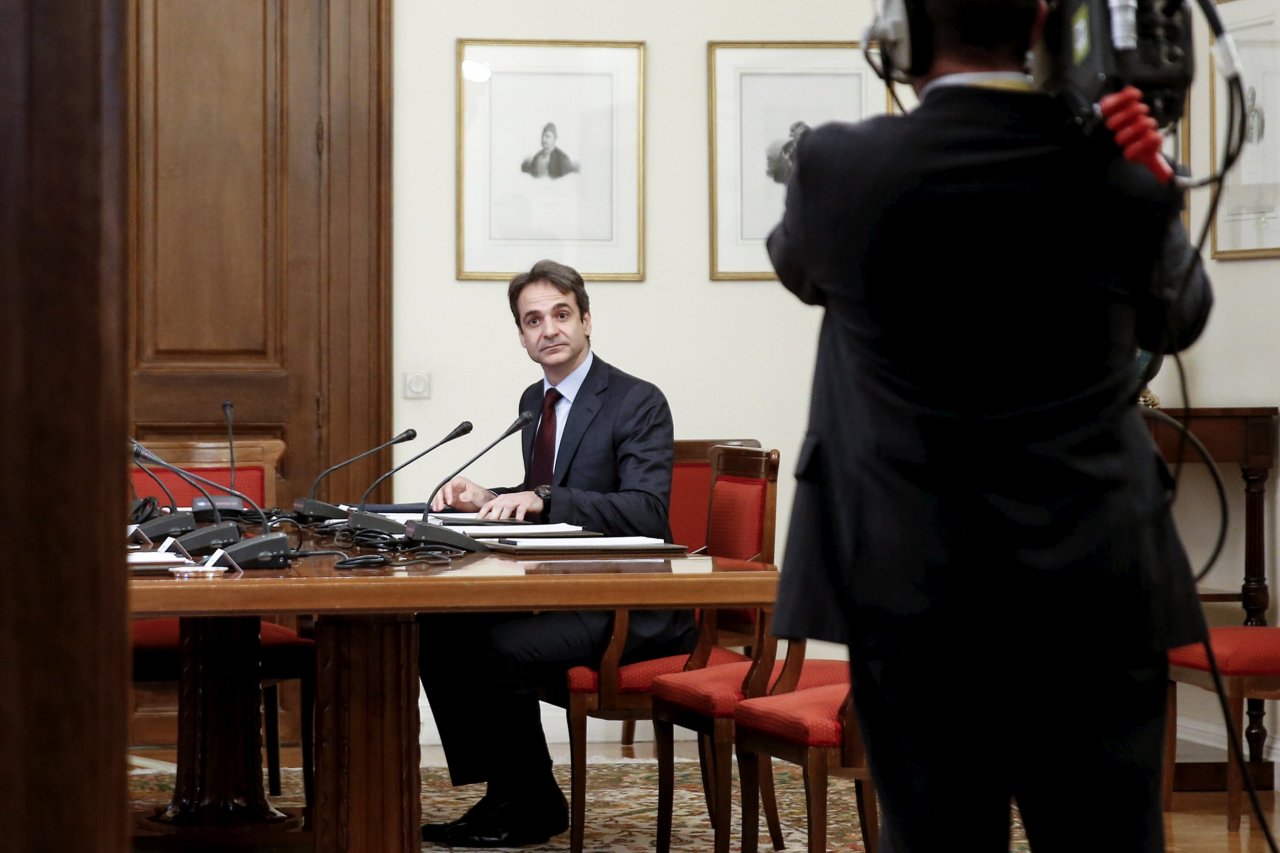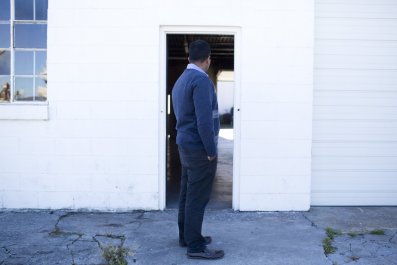Kyriakos Mitsotakis thinks he's seen the political future—and it's in his poll numbers. At a time when centrists across Europe are in retreat, Greece's opposition leader believes his country has had its populist moment and is ready to vote for a straight-talking pragmatist. "The pendulum tends to swing [back] in the other direction," he tells Newsweek in his Athens office. "I think that's where we are right now."
Soberly dressed but energetic—the orderliness of his neat blue shirt and tie contrasts with the constant motion of his hands as they twirl a string of black worry beads—Mitsotakis, 48, has charisma. But it's different from the electric, unrestrained style of his chief political opponent, Alexis Tsipras, the 42-year-old prime minister and a former Communist. If the Syriza party leader is like a rebellious student, Mitsotakis is like a patient schoolteacher.
Since his election in January to the leadership of Greece's center-right opposition party, New Democracy, Mitsotakis has helped it sustain a lead over the Syriza-led leftist government in Greek opinion polls that registers in the double digits. Elections aren't due until 2019, but Mitsotakis is calling for them to be brought forward over the government's handling of the economy, and he predicts he would win a vote if one is held in 2017.
Meanwhile, he has built a reputation as a reformist and says he wants to rid Greek politics of nepotism and turn the country into more of a meritocracy. Might it be a problem, then, that his sister Dora Bakoyannis is a former foreign minister and their father, Konstantinos, used to be prime minister? "I'm proud about my family heritage, and I'm proud about my dad," he says, but "I've reached this position working very, very hard, and in a sense my [family] name is a drawback now."
If it is a burden, the family name has not prevented Mitsotakis's unexpected rise to prominence. He was not the most obvious choice in the party leadership contest in January; he defeated then-acting leader Evangelos Meimarakis, a former defense minister. Mitsotakis pitched himself as a pragmatic moderate who would provide a viable alternative to an "ineffectual and populist" government. He forged his politics, he tells Newsweek, in the decades of polarization that followed the collapse of the military junta that ruled Greece from 1967 to 1974.
As a child and young man, Mitsotakis strongly disliked his father's political rival, the socialist Andreas Papandreou, who was prime minister during much of the 1980s and some of the '90s and leader of the center-left PASOK party. Mitsotakis calls Papandreou the "quintessential Greek populist politician." The period established in his mind a fault line between populism and realism. "It is still a very relevant distinction today," he says, "one that the world is gradually discovering but which was always present in Greek politics since democracy was re-established."
Mitsotakis says Tsipras is the same sort of politician as Papandreou; both "offer easy and convenient solutions to difficult problems," he says. Syriza won the Greek election in January 2015 on a promise that it would negotiate with the country's creditors—the European Central Bank, the European Commission and the International Monetary Fund—to write off some of Greece's crippling debt and allow it to increase public spending.
Read more: Why The Fragile Stability in Greece May Not Last Much Longer
But the creditors did not back down, and Tsipras had to accept a new austerity program, committing to tight restrictions on raising taxes, state spending, privatization of national companies and other reforms that his government is now implementing. "I think people at some point, after being very tired, thought there was an easy way out," says Mitsotakis of Tsipras's victory in January 2015. "I don't necessarily blame them. But I do blame those who made the case—either knowingly, which is outright deceit, or because they were completely ignorant about the world of real politics."

The Syriza government says that it is making strong progress with reforms and that it's time for its European negotiating partners to be more flexible; it wants tight public-spending targets relaxed and more debt relief. "The eurozone needs to be successful at this moment, and you are successful when you find solutions to political problems," Finance Minister Euclid Tsakalotos said in a speech in Athens in November. Nor did Syriza cause the crisis: decades of PASOK and New Democracy governments did, something Mitsotakis would need to answer for during an election campaign.
Mitsotakis is cagey when asked about his party's record in government. "I prefer to look into the future rather than assess what happened in the past," he says. The party has "recognized that we also have our share of responsibility for the crisis," but in Greece after the return to democracy "it was basically PASOK that governed most of the years [after 1981], so you can allocate the blame based on the percentage of time spent in power."
That's a somewhat airbrushed version of New Democracy's role in the crisis. Antonis Samaras, the New Democracy prime minister from 2012 to 2015, was certainly never as aggressive toward creditors as Tsipras, but in 2011 he too railed against the creditors' economic policies. He told British newspaper The Guardian in 2011, before his election, "The austerity measures aren't working." Mitsotakis denies his party's actions were comparable to Syriza's. "I think overall we've been much more realistic," he says.
Mitsotakis also says Greece should take more responsibility for solving its problems, rather than putting the burden on its creditors. "There are still people in Greece who believe that the crisis was a result of the [bailout] programs, rather than the other way around," he says. "Europe has its own fair share of blame for the mess we've found ourself in, but at the end of the day it's up to us to implement the necessary changes to have a competitive economy."
Like the government, he would like the creditors to promise Greece more debt relief and relax some of their targets, but he thinks it's up to the Greek government to implement economic reforms more enthusiastically first, in order to win the creditors' goodwill. And, he says, the government's strategy has prioritized heavy taxation over targeted cuts to public spending, which he says hampers economic growth. Some business leaders also want to see less emphasis put on taxes: The country's American-Hellenic Chamber of Commerce and National Confederation of Hellenic Commerce have both called for lower taxation.
But the Syriza that Mitsotakis is facing now is not the Syriza of 2015—and the left-wing party's shift to a more moderate approach could undercut New Democracy's appeal. The government is working to implement reforms, including an ambitious privatization program that covers infrastructure, utilities and other assets. A Cabinet reshuffle in November demoted some of the government's more fiery left-wing figures. Where the government has clashed with the creditors recently—for example, in a recent dispute over union rights—it has argued it is standing up for Greece's downtrodden to prevent future instability, and it secured some debt relief from the creditors at a recent summit. Mitsotakis may not like the government, but now that it has worked to secure a better relationship with the creditors, wouldn't it be better for the country to let it continue rather than risk instability with an early election?
"If this government is a problem, then the election is a solution," he says. The problem, he argues, "is that this government does not own the reform agenda. There's still significant internal infighting among various ministers every time we try to do a privatization or every time we try to support entrepreneurship and private wealth creation."
With Greece gradually returning to economic growth, it's hard not to wonder if he is just worried that Tsipras will look better to voters when the next election is due in 2019. Mitsotakis insists that is not the case. "It is our job to convince people that we will be much, much better equipped than this government to do the job with a different mindset and a different team," he says.
At a time when the political center is collapsing in Europe—and the populist Donald Trump is about to become the United States's president—Mitsotakis is happy to call himself a centrist and a reformer. He believes that moderates preparing for battles with populists elsewhere can look to Greece as an example. "The answer to populism is telling people the truth," he says. "But I also tell them, 'If we can do this, there is a much better future.' So it's not just about short-term pain."
If Mitsotakis is right, his country is two years ahead of a cycle that many countries are now just beginning. "In my mind, the Tsipras government is the last chapter of the old book," he says, "not the first chapter of a new [one]."






















